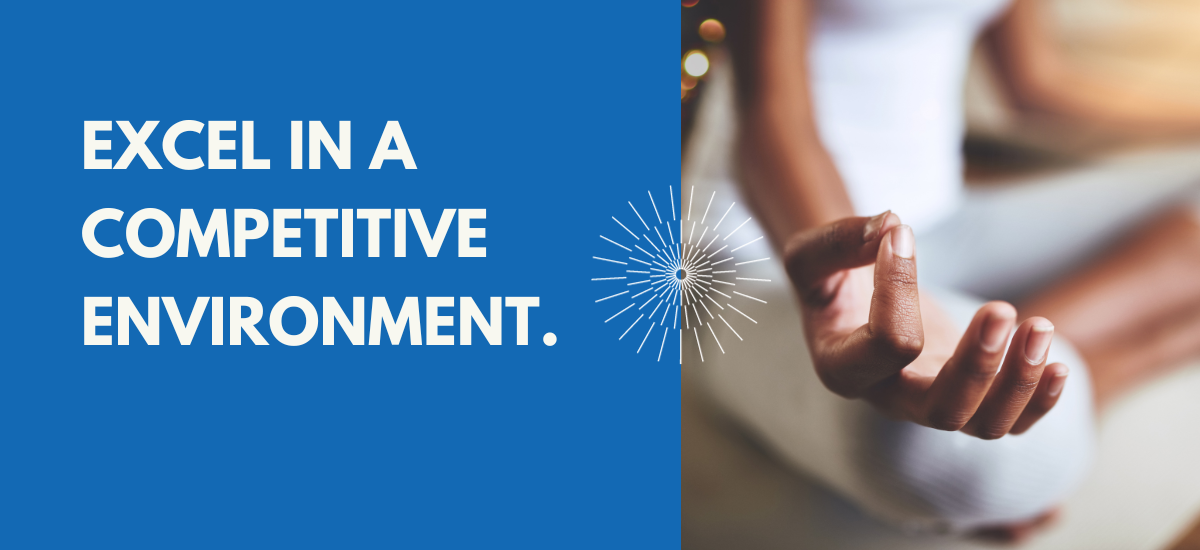Calm And Confident: How To Excel In A Competitive Environment

Introduction
Competition is an inevitable part of life, and it can be especially intense in a professional setting. While a certain level of competition can be healthy and drive us to perform our best, excessive competition can lead to stress and burnout. For instance, in the famous movie 3 idiots, Chatur competing with Rancho only harmed his own well-being. In this blog, we’ll explore the strategies that you can use to stay calm in a competitive environment and perform at your best without sacrificing your well-being.
Staying calm in a competitive environment is a challenging task. The fast-paced and high-stress surroundings can quickly lead to anxiety, frustration, and burnout. Whether you’re in the corporate world, sports, or any other competitive field, it’s essential to find ways to manage your emotions and maintain a sense of peace. In this blog, we will explore the different techniques you can use to stay calm and focused in a competitive environment.
Mindfulness meditation
Mindfulness meditation is a powerful tool for reducing stress and calming your mind. The practice involves focusing your attention on the present moment and accepting your thoughts and feelings without judgment. When you’re in a competitive environment, it’s easy to get caught up in thoughts about the future or the past, but mindfulness meditation can help you stay focused on the present. To practice mindfulness meditation, you can start by finding a quiet and comfortable place to sit or lie down. Close your eyes and focus on your breathing, noticing how your chest rises and falls with each inhale and exhale. When your mind starts to wander, simply acknowledge your thoughts and bring your attention back to your breathing. You can practice mindfulness meditation for as little as five minutes a day and gradually increase the duration as you get more comfortable with the practice.
Physical exercise
Physical exercise is another excellent way to stay calm and focused in a competitive environment. Exercise releases endorphins, the feel-good hormones in your brain, which can reduce stress and improve your mood. Additionally, exercise can help you clear your mind and refocus your energy, so you’re better equipped to handle the challenges of your competitive environment. Whether it’s a brisk walk, a yoga class, or a full-blown workout, make sure to incorporate physical activity into your daily routine.
Positive self-talk
A positive self-talk is an essential tool for staying calm in a competitive environment. The thoughts you have about yourself and your abilities can have a significant impact on your performance. When you engage in negative self-talk, you can quickly become overwhelmed and lose confidence. On the other hand, when you engage in positive self-talk, you can boost your self-esteem and maintain a positive outlook, even in challenging situations. To engage in positive self-talk, try to focus on your strengths and accomplishments and acknowledge your progress, even if it’s small. When you encounter a setback, try to reframe the situation in a positive light and focus on what you can learn from the experience.
Time management
Time management is critical for staying calm in a competitive environment. When you’re feeling overwhelmed, it’s easy to get caught up in the cycle of stress and anxiety. To avoid this, make sure to prioritize your tasks and allocate your time wisely. Use a to-do list or a scheduling app to keep track of your responsibilities and ensure you have enough time for self-care activities, like exercise or mindfulness meditation. Additionally, make sure to set realistic goals and expectations for yourself, and don’t be afraid to delegate tasks or ask for help when you need it.
Communication and collaboration
Communication and collaboration are important aspects of staying calm in a competitive environment. When you work in a competitive field, it’s easy to become isolated and focused solely on your goals, but this can lead to feelings of frustration and burnout. To stay calm and focused, make sure to cultivate positive relationships with your colleagues and maintain open lines of communication. When you work together as a team, you can share the load and support each other in times of stress. Additionally, working collaboratively can help you see things from a different perspective and find new solutions to challenging problems.
Self-care
Self-care is crucial for staying calm in a competitive environment. When you’re in a high-stress environment, it’s easy to neglect your physical and emotional well-being. To stay calm and focused, make sure to prioritize self-care activities, such as eating a balanced diet, getting enough sleep, and engaging in hobbies or leisure activities that you enjoy. Additionally, make time for relaxation and stress-management techniques, such as deep breathing exercises, guided meditations, or aromatherapy. By taking care of yourself, you can maintain your energy levels, reduce stress, and be better equipped to handle the challenges of your competitive environment.
Gratitude practice
Gratitude is a powerful tool for staying calm in a competitive environment. When you focus on the things you’re grateful for, you can shift your perspective and reduce feelings of stress and anxiety. To practice gratitude, try to make a habit of listing three things you’re grateful for each day, no matter how small they may seem. Additionally, try to express your gratitude to others, whether it’s through a thank-you note, a phone call, or a simple act of kindness. By focusing on gratitude, you can cultivate a positive outlook, even in challenging situations.
Set realistic expectations
Finally, it’s important to set realistic expectations for yourself in a competitive environment. When you set unrealistic goals or expectations, you can quickly become overwhelmed and stressed. To stay calm and focused, make sure to set achievable goals and expectations for yourself, and don’t be too hard on yourself if you don’t meet them. Instead, focus on the progress you’ve made and celebrate your accomplishments, no matter how small they may seem.
In conclusion, staying calm in a competitive environment requires a combination of mindfulness, self-care, and a positive outlook. By incorporating these techniques into your daily routine, you can reduce stress, maintain your focus, and perform at your best, even in challenging situations. Remember to prioritize your well-being and make time for self-care, so you’re better equipped to handle the demands of your competitive environment.
Related Articles

Letting Go With Grace: Emotional Tools for Closure
Letting go is never easy. Whether we are parting ways with a loved one, ending a relationship, leaving a job, or saying goodbye to a cherished chapter of life, the emotional weight can feel overwhelming. Yet, closure is essential for our emotional well-being. Without it, we carry unresolved grief, anger, regret, or longing that can seep into new relationships and experiences, holding us back from healing and growth.

Breakup Blues: How to Cope and Rebuild Your Self-Worth
A breakup often feels like a silent earthquake—unseen by others but devastating within. The pain doesn’t just come from the loss of a relationship, but from the crumbling of the life, identity, and future you built with another person. You may find yourself questioning your worth, doubting your value, and feeling isolated even when surrounded by people. In Indian society, where emotional expression is often discouraged and breakups can be stigmatized, this pain may feel even more overwhelming. But the truth is—while breakups may shake you, they do not define you. You are not broken; you are in a process of emotional reformation. And with the right tools, guidance, and support system, you can rebuild not just your self-worth but also your entire life narrative.

Healing After Heartbreak: A Mental Health Perspective
Heartbreak doesn't just break your heart—it can shatter your sense of identity, peace, and purpose. Whether the end was expected or abrupt, mutual or one-sided, short-lived or long-term, the aftermath often leaves people emotionally disoriented. In Indian culture, where societal expectations and family involvement in romantic relationships are prevalent, the pain is not just personal—it is public. Yet, very few are taught how to heal from emotional loss in a healthy, sustainable way.

Boundaries in Love: Saying ‘No’ Without Guilt
Love, in its truest form, should be a safe space—a space where individuality is not only respected but celebrated. Yet, in many relationships, especially in the Indian cultural context, love is often misunderstood as constant availability, complete sacrifice, and putting the other person first, always. As noble as this may sound, this version of love often leads to emotional exhaustion, suppressed resentment, and the erosion of one’s identity.

Gaslighting in Relationships: What It Is and How to Heal
Gaslighting is a form of emotional abuse that erodes your ability to trust your own perception. It’s a slow, insidious process that often begins with subtle doubts and ends with complete self-questioning. In romantic relationships—especially in the Indian context where silence, compromise, and duty are often mistaken for love—gaslighting can be even harder to recognize.

How Depression Can Affect Your Relationship—And What You Can Do
Depression is not just an internal struggle—it ripples outward, affecting relationships, routines, and the emotional fabric that holds people together. When someone is dealing with depression, it's not only their world that becomes dim—it can cast a shadow over their most intimate connections too. In a country like India, where open conversations about mental health are still rare and love is often equated with endurance, depression within a relationship can become invisible, misunderstood, or misjudged.
